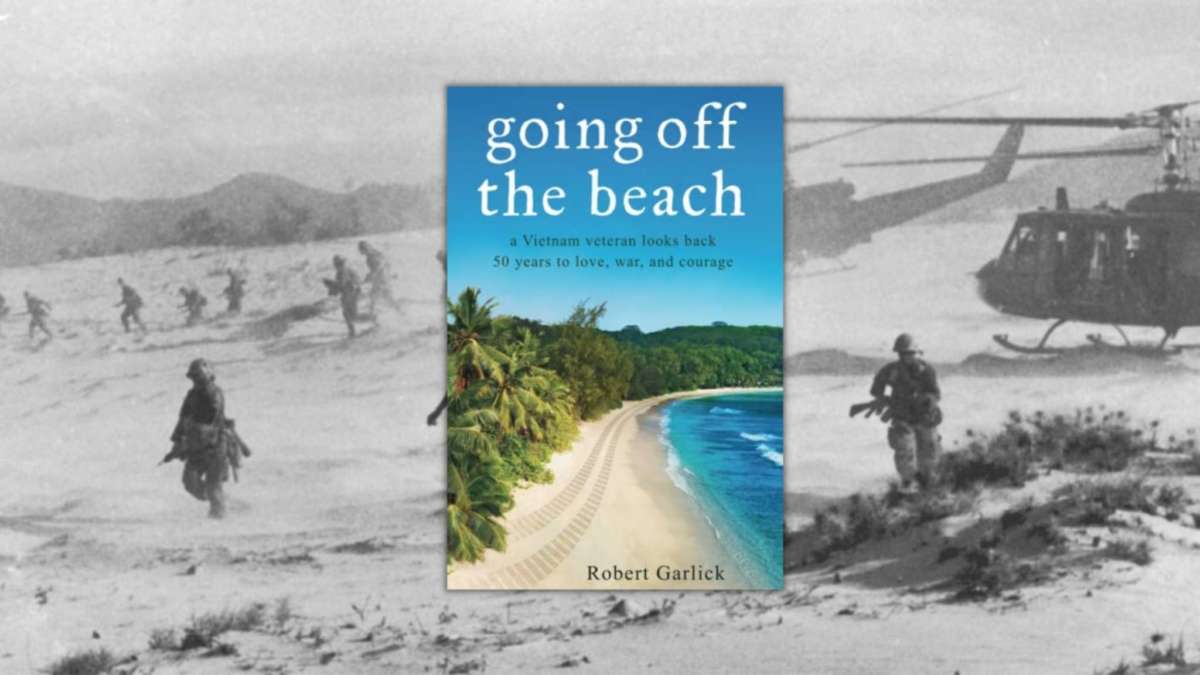Going Off The Beach by Robert Garlick
What's It About?
Drafted into the Army when he was 20 and sent to South Vietnam in 1969, Robert Garlick spent the next year in the “hostile, volatile, bloody” Binh Dinh Province on the country’s central coast.Drafted into the Army when he was 20 and sent to South Vietnam in 1969, Robert Garlick spent the next year in the “hostile, volatile, bloody” Binh Dinh Province on the country’s central coast.
“If one were to review my military records, I am certain one would find them most unremarkable,” he writes in his debut memoir, Going Off the Beach (Gatekeeper Press). He was discharged without “a single black mark or smudge of any kind, not one single disciplinary action. But also, not a single medal beyond the very basic standard ones. It would look as if I were a phantom soldier. But that would be a false narrative.”
Answering the question “What was Vietnam like?” took him 50 years.
In and out of college and, with a draft status of 1-A and unable to find a job, Garlick was inducted in April 1968 along with 30,000 men, the largest single draft for the Vietnam War. He notes that many of his fellow inductees couldn’t read or write; many never graduated from anything. “Why didn’t I ever meet anyone from Harvard?” he wonders.
THE EVIL OF WAR IS IN THE BANALITY OF GARLICK’S DETAILS
Basic training is sketchy; the Army’s main job is training young men to follow orders. Garlick gets artillery training and asks to be assigned to South Vietnam hoping for an early discharge.
“I have written this story as if watching a movie,” he writes in his introduction, and the book opens with a cinematic description of the most beautiful beach he’s ever seen. He’s just traveled for many uncomfortable hours through jungle atop an armored personnel carrier when the Pacific appears — 15-foot waves crashing on the sand, pushed out of a flat calm blue expanse that disappears into infinity.
“I cannot let it go, this place, this beach, this moment in time. So deeply imprinted into me that it is now part and parcel of my DNA. I have to remember this, for to let it go, is to let go of life itself.”
The book’s title refers to what happens after Garlick’s unit leaves the beach after an unsuccessful village raid. In the dunes, they’re attacked by Viet Cong. Two dozen wounded men are evacuated and Garlick is among the group left behind to guard the wrecked personnel carrier until it, too, can be airlifted away. Addled by thirst, he almost shoots a village woman who refuses him a coconut. He also almost shoots a sadistic American soldier who gassed a group of kids at play.
The evil of war is in the banality of Garlick’s details. He feels the shock waves of carpet bombing in the distance, escapes gunfire from the Viet Cong as he drives on dangerous roads. Men near the end of their tours are replaced by new men coming in. “The time moves slowly, the days drag, and my days and nights are just an unchanging series of shit work details and guard duty.”
HIS WRITING STYLE IS VIVID AND HEARTFELT
He falls in love with a Vietnamese bar girl, goes AWOL. He begins to smoke marijuana. “I don’t think I know any enlisted man who is not smoking pot. … The hard-core lifers do what they always do; they stay inside their hooches and crawl into their bottles.” The animosity between the enlisted men and the lifers is thick. “Everything is a cover up; no one leads,” he writes.
After two years of “lost youth,” Garlick tries to hold a philosophical view. “Because I went to Vietnam, it meant someone else didn’t have to go.” The war left him with tinnitus and a bum knee. It took 50 years for the Veteran’s Administration to admit that his injuries most likely happened when he was in the Army.
At home, his mother tells him that someone has asked her what her son says about Vietnam. Her response: “He says nothing, nothing at all.”
It seems Garlick has made up for this reticence with Going Off the Beach. His writing style is vivid and heartfelt, and he succeeds at conveying what it was like to be a cog imprisoned in a powerful machine.
This book is a remarkable account of being one of the thousands of soldiers whose young lives were interrupted to fight a losing war in a foreign land, only to be shunned and misunderstood when they returned home. It’s a story many of them could have told — if they came back alive. We are fortunate indeed that Garlick did.
Going off the Beach can be purchased here.
RELATED POSTS
Witness the Brutality of the Vietnam War in “The First Door Is the Final Exit”
Vietnam Vet Learns What It Means to Be a Hero in an Imperfect World
Novella by a Vietnam Vet Is a Masterful Study of a War-Ravaged Psyche
“Seeing the Light” Reveals the Stories Behind and Beyond the Uniform
https://booktrib.com/wp-content/uploads/2022/05/robert-garlick-author-300×300.jpg
The author, seen at the beach circa 1956, contemplating his future
About Robert Garlick:
Robert Garlick is a Vietnam Army veteran, serving 12 months in Vietnam (February 1969 to February 1970) in the Artillery, Infantry, and as a Staff Duty Driver. Honorably discharged, he returned to school and earned a B.S. in Civil and Environmental Engineering from the University of Rhode Island. This is his debut published work. He lives on the beach.
Buy this Book!
Amazon




